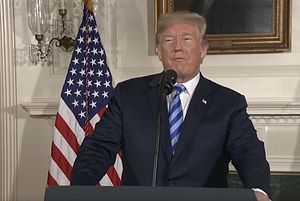On Tuesday, U.S. President Donald J. Trump announced that he had decided to pull the United States out of the Joint Comprehensive Plan of Action (JCPOA)—colloquially known as the Iran deal—and to reimpose U.S. sanctions on Iran that had been lifted with the deal’s implementation in 2015. The move puts the United States in breach of the 2015 agreement, which was concluded by the Obama administration after nearly two years of negotiation. The United States joined the other permanent members of the United Nations Security Council—Russia, China, the United Kingdom, and France—and Germany in negotiating with Iran.
According to a fact sheet released by the U.S. Department of the Treasury, effective Tuesday, the United States will enter a wind-down period before snapping back the sanctions it agree to lift in 2015 on Iran. After 90 days—on August 6—U.S. sanctions on Iran’s acquisition and purchase of U.S. dollar notes , on its trade in gold and precious metals, on the sale and transfer of various metals and materials, on the Iranian rial, on Iranian sovereign debt, and on Iran’s automotive sector will come back into place. The United States will also revoke JCPOA-specific import authorizations for Iranian goods.
Later in the year, on November 4, a second 180-day wind-down period will end and the United States will implement further sanctions against Iran. According to the U.S. Treasury Department, these will include sanctions on Iran’s shipping industry, oil industry, secondary sanctions against third-country financial institutions doing business with Iran, and sanctions on Iran’s energy sector. Other JCPOA-specific exceptions for Iran will also end.
The Trump administration’s decision to reimpose sanctions on Iran without any evidence of Tehran’s noncompliance with the terms of the JCPOA sets the deal on a course for disintegration. Reacting to Trump’s announcement on Tuesday evening, Iranian President Hassan Rouhani said that Iran would remain in the agreement for now and seek to salvage a way to move forward with the remaining parties, all of whom continue to support the agreement. The so-called European-Three (E3)—Germany, France, and the United Kingdom—expressed their disappointment in Trump’s decision.
Rouhani noted that Iran will reserve the right to begin enriching uranium to levels prohibited by the JCPOA should negotiations with the remaining parties in the JCPOA fail to arrive at a satisfactory solution. Specifically, given the massive economic costs the resumed U.S. sanctions are likely to impose on Iran, the E3, Russia, and China would have to muster considerable and exceptional economic assistance for Tehran. However, given the nature of the U.S. sanctions, entities in these countries would run afoul of U.S. sanctions themselves.
Under the terms of the JCPOA in 2015, Iran received sanctions relief in exchange for agreeing to stringent and verifiable limits on its civilian nuclear program. It retained an ability to domestically enrich uranium, but only to 3.67 percent uranium-235. Its ability to stockpile enriched uranium was curtailed and known enrichment sites were converted to research facilities, leaving Natanz as the sole site of continued enrichment activity. Iran was also limited to using its first-generation IR-1 centrifuges. Various components of the JCPOA expire, but the agreement also saw Iran agree to the International Atomic Energy Agency’s (IAEA) Additional Protocol, whose requirements last indefinitely.

































